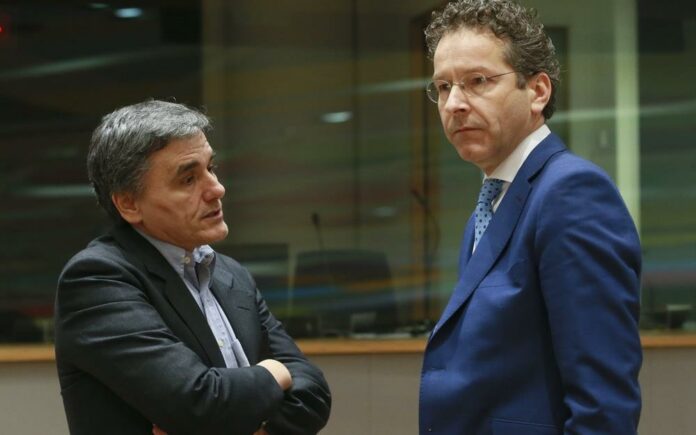By T. Tsiros
[email protected]
“Measures and counter-measures” was the leftist Greek government’s catch-phrase on Monday evening in the wake of a Eurogroup meeting that essentially opened the way for a return of creditors’ negotiators back to Athens. The development comes after demands, mostly by the IMF, for “precautionary measures” appear to have been accepted by the Greek side.
“For every euro resulting from the lowering of the tax-free threshold, the Greek government will have the right to enact corresponding reductions in the property tax or VAT rates,” was the phrase uttered by several top officials from the leftist-rightist coalition.
Putting what Eurogroup chairman Jeroen Dijsselbloem referred to as deep “structural reforms” into numbers, as well as finalizing the number of years after 2018 that Greek governments will have to post primary budget surplus targets (as a percentage of GDP) of 3.5 percent, is now on the agenda for next week’s resumed negotiations in Athens.
Nevertheless, the first “unofficial” acknowledgement that the Greek side will consider lowering the tax-free threshold for yearly income and reducing so-called “personal differences” in pension rates, essentially a harmonization of social security benefits downwards, emerged on Monday afternoon.
Dijsselbloem, in fact, speaking after the one-hour Eurogroup meeting in Brussels on Monday, directly referred to reforms in the pension, labor and tax systems.
The “line of defense” by the Tsipras government, which is now trailing the main opposition by double-digit margins, holds that for every “negative measure” to be legislated now for implementation after 2018, the Greek side will pass a “positive measure” as an off-setting procedure.
Such off-sets, according to the initial leaks out of the Greek capital, include:
- Reductions in the widely unpopular property tax (ENFIA), especially for lower-income taxpayers and people with low-value real estate holdings. If a 30- to 40-percent decrease materializes, the total fiscal gap in the current budget is roughly one million euros.
- Reduction in the now “Scandinavian” VAT rates for several categories of goods and services, including in the energy sector.
- Lowering the VAT rate for transports and foodstuffs from the stratospheric 24 percent to the previous 13 percent
- Recalculating, downwards, the very high social security contributions imposed on self-employed professionals














